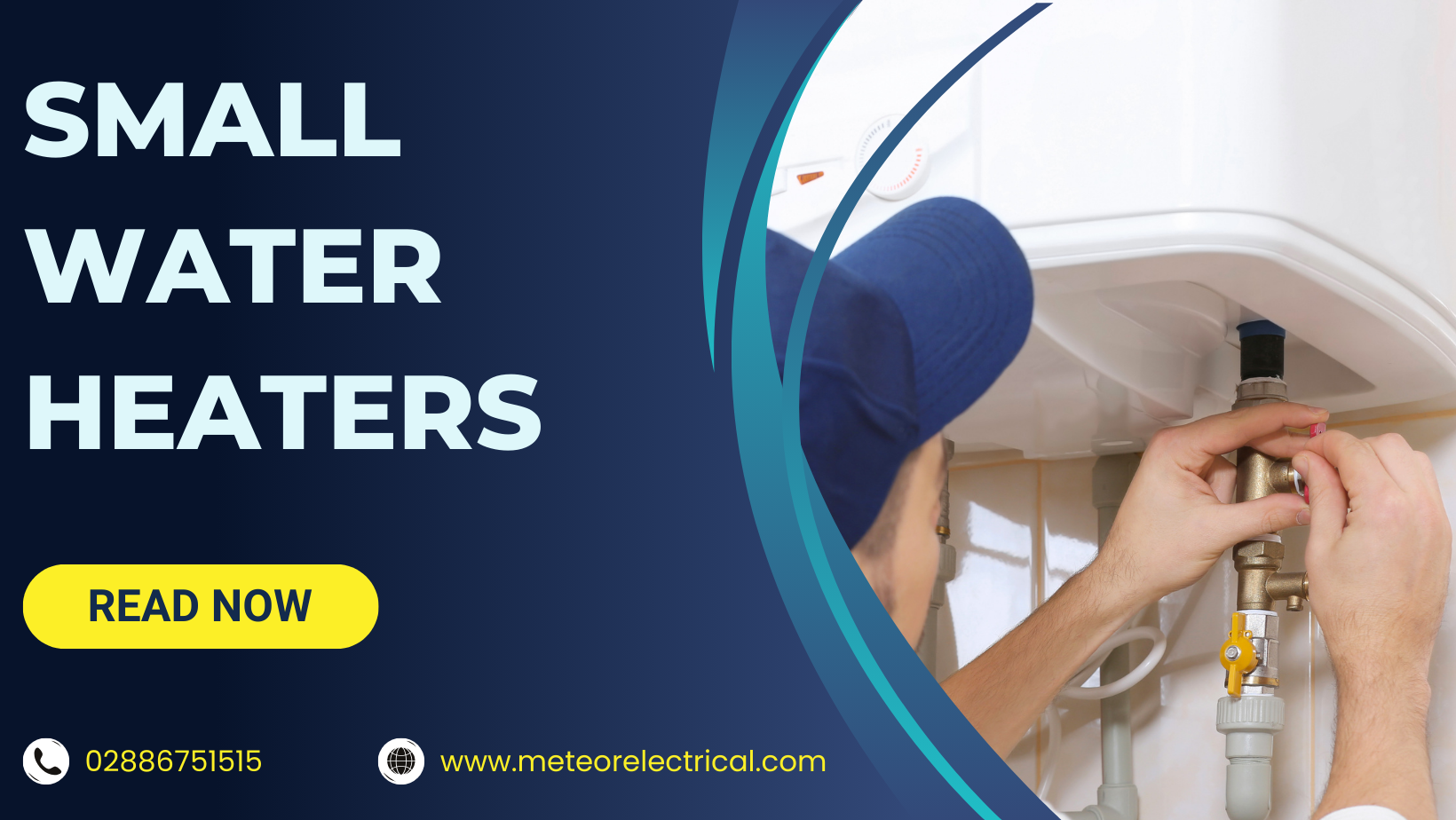Small Water Heaters
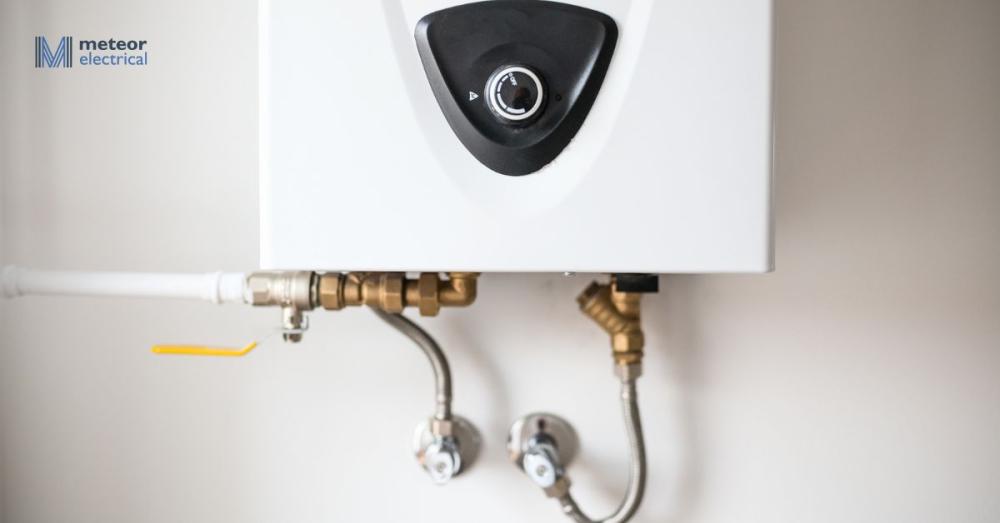
When you think of a hot water heater, many envision a large, bulky cylindrical machine hogging valuable space in your basement or utility room. While these traditional tank-style water heaters are common, the market has evolved to offer smaller, more compact options that fit seamlessly into modern living spaces.
If you're seeking a hot water solution that blends convenience with energy efficiency, small water heaters might be the perfect fit for you. Not only are these compact systems cost-effective, but they also utilise energy more efficiently than their larger counterparts, helping you save on utility bills without compromising on performance.
Whether you're renovating your kitchen, upgrading your bathroom, or looking to optimise your entire home's hot water system, this guide from Meteor Electrical covers everything you need to know about small water heaters. Dive in to explore the benefits, types, installation tips, and maintenance advice to make an informed decision for your home or business.
What Are Hot Water Heating Systems?
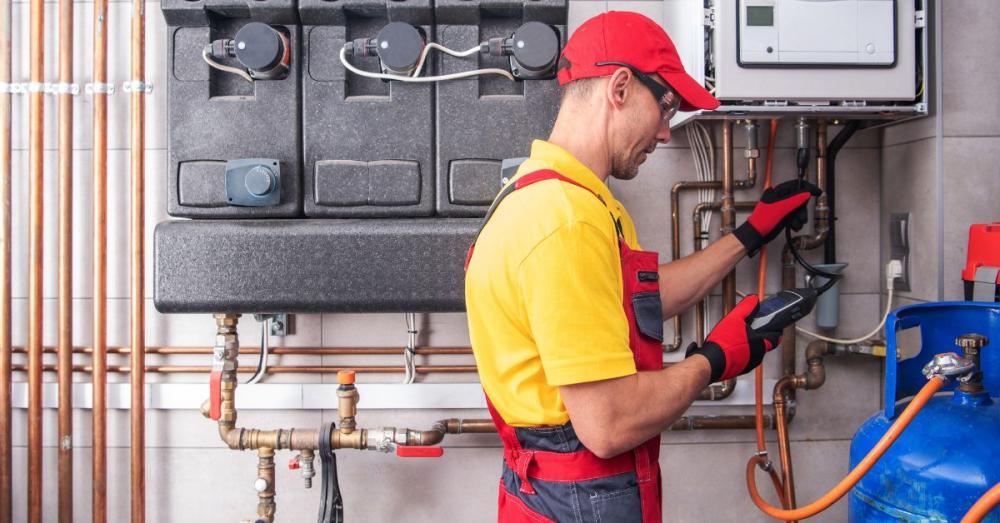
Before diving into the specifics of small water heaters, it's essential to understand the fundamentals of hot water heating systems. These modern appliances are among the best investments for both residential and commercial properties, providing a reliable source of hot water for various needs—from taking a relaxing bath to handling daily laundry tasks.
At their core, hot water heaters work by taking in cold water and heating it using an energy source, such as electricity or gas. The heated water is then stored in a tank or delivered on demand, ensuring you have access to warm water whenever you need it. There are several different types of hot water heaters available, each varying in how they heat and store water.
Energy-efficient water heaters are particularly popular as they help reduce energy consumption and lower utility bills. By choosing the right system, you can create a comfortable environment during the colder months while also contributing to a more sustainable household or business operation.
One of the critical factors to consider when selecting a hot water heater is its size. Traditional units can be quite large, but small water heaters offer a space-saving alternative without sacrificing performance. These compact systems are not only more energy-efficient but also eco-friendly, making them a smart choice for environmentally conscious consumers.
Moreover, small water heaters can be paired with renewable energy sources, such as solar panels, to further enhance their efficiency and reduce your carbon footprint. Electric water heaters, in particular, offer modern capabilities and modular designs that allow for easy integration into existing heating systems, providing flexibility and control over your hot water supply.
What Are Small Water Heaters?
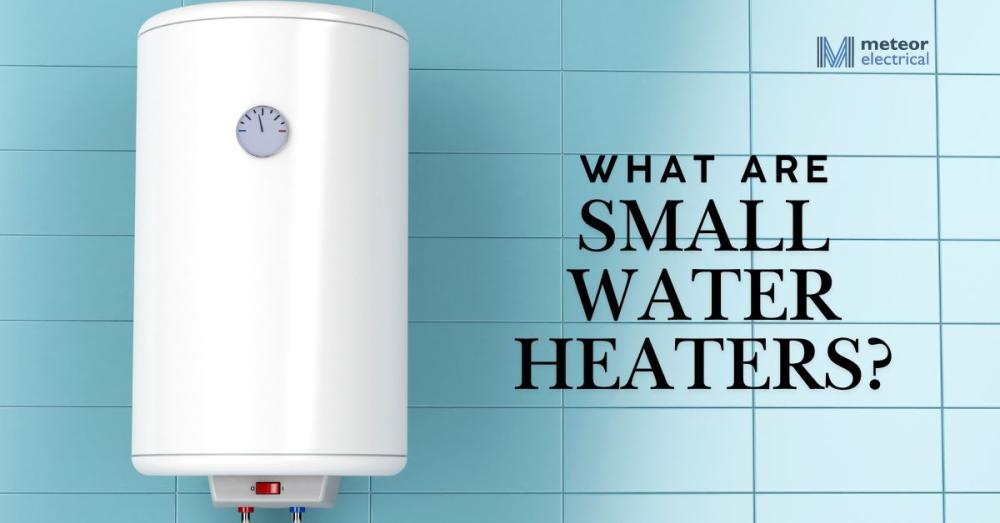
Small water heaters, often referred to as under-sink water heaters or on-demand water heaters, are compact appliances designed to provide hot water without the need for a large tank reservoir. Their small size makes them ideal for installation in tight spaces, such as under sinks or mounted on walls, ensuring that you have quick and easy access to hot water wherever you need it.
Unlike traditional tank-style heaters that store large quantities of water, small water heaters either heat water instantly as it flows through the device or preheat small amounts of water for immediate use. This on-demand functionality means you don't have to wait for a tank to fill up and heat before getting hot water, making these systems both convenient and efficient.
- Benefits of small water heaters include:
- Space-saving design: Perfect for apartments, condos, or homes with limited space.
- Energy efficiency: Lower energy consumption compared to larger tank-style heaters.
- Quick installation: Easy to install in various locations without extensive plumbing modifications.
- Reduced energy waste: No need to maintain a large tank of hot water, minimising standby energy losses.
You can connect small water heaters to your main cold or hot water supply, depending on your specific needs. For instance, if you want hot water available instantly, connecting the heater to a warm water supply can expedite the process. Even if you already have a conventional hot water heater, adding a small water heater can ensure a steady hot water supply in areas that experience high demand or inconsistent temperatures.
The versatility of small water heaters extends to both residential and commercial applications. Whether it's enhancing the comfort of your home or ensuring efficiency in a busy office, these compact systems offer reliable performance without the bulk of traditional heaters.
Credit: GreenMatch UK
How Do Small Water Heaters Work?
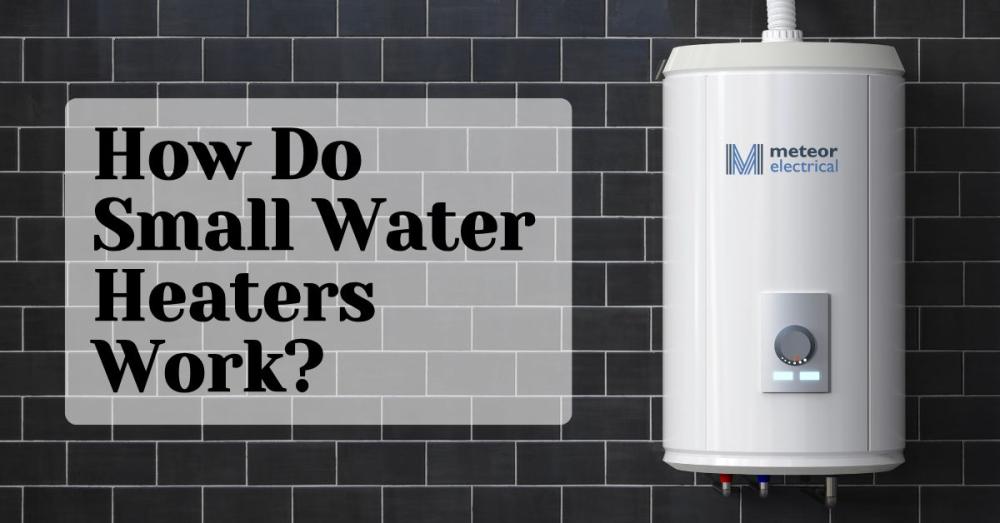
Small water heaters operate differently from conventional tank-style systems primarily because they lack a large storage reservoir. Instead, they focus on heating water instantly or maintaining a small supply of preheated water ready for immediate use.
Here's a breakdown of the typical operation process in small water heaters:
1. Cold Water Intake: The process begins when cold water enters the heater through an inline filter connected to the cold water supply line. This filter removes impurities, ensuring that the hot water remains clean and free from contaminants.
2. Heating Unit: After filtration, the clean water moves into the heating unit. This unit typically comprises two chambers:
- Cold Water Chamber: Holds the incoming cold water until it's needed.
- Hot Water Chamber: Houses the newly heated water, maintaining it at a steady temperature until it’s called for.
3. Heat Exchanger: The core component responsible for warming the water is the heat exchanger. Depending on the model, this could be an electric heating element or a gas burner:
- Electric Heating Elements: Common in many small water heaters, these elements efficiently transfer heat to the water as it flows through the unit.
- Gas Burners: Some models utilise gas burners to achieve rapid heating, though they may require proper ventilation and gas line connections.
4. Instant Delivery: As soon as you turn on the faucet, the heated water is delivered directly from the hot water chamber to your desired outlet, ensuring minimal wait time and maximum efficiency.
Since small water heaters do not rely on a large tank to store hot water, they can respond quickly to hot water demands, providing a continuous supply as long as water is flowing through the system. This on-demand capability not only enhances convenience but also contributes to energy savings by eliminating the need to maintain a large volume of hot water continuously.
Optimal Temperature Settings
Choosing the right temperature for your small water heater is crucial for both comfort and safety. While personal preferences vary, there are general guidelines to ensure optimal performance and longevity of your appliance:
- Recommended Range: Set your thermostat between 50°C to 60°C (122°F to 140°F). This range provides comfortable hot water for everyday tasks without posing a risk of burns or scalding.
- Safety Considerations: If you have children or elderly family members, it's advisable to stick to the lower end of the temperature range to prevent accidental burns.
- Energy Savings: Lowering the temperature not only enhances safety but also reduces energy consumption, leading to lower utility bills.
Most small water heaters come equipped with highly accurate thermostats, allowing you to fine-tune the temperature settings to match your specific needs. Additionally, if you're planning to be away from home for extended periods, reducing the temperature can further conserve energy.
What Are The Different Types Of Small Water Heaters?
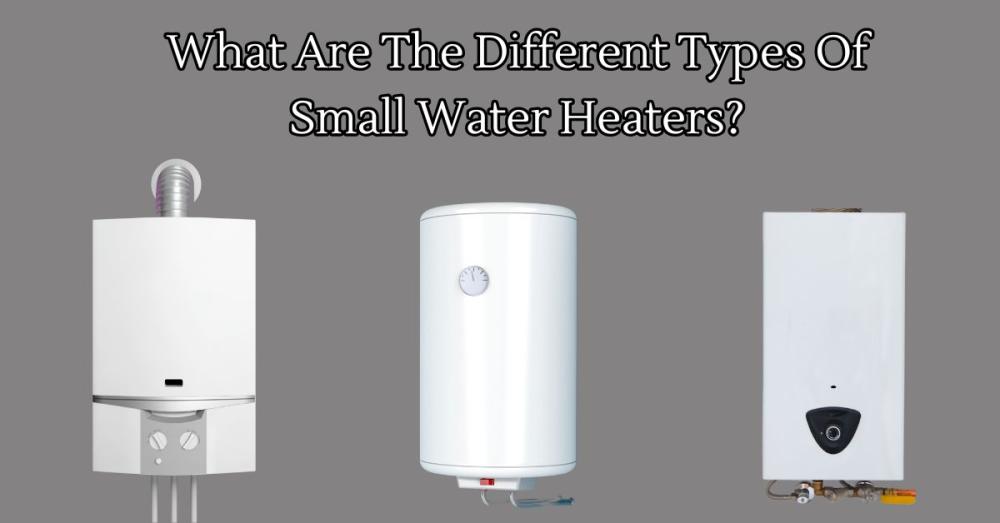
Small water heaters come in various types, each tailored to meet different needs and preferences. Understanding the distinctions between these types can help you select the best option for your specific application. Here are the primary categories of small water heaters available in the market:
1. Small Tank Water Heaters
Small tank water heaters, as the name suggests, come equipped with a storage tank, albeit much smaller than traditional models. These units typically hold between 2.5 to 8 gallons of water, providing a ready supply of hot water for immediate use.
Advantages:
- Immediate Availability: Preheated water is readily available without waiting for the system to heat up.
- Energy Efficiency: While they do consume energy to maintain the water temperature, their smaller size reduces overall energy usage compared to larger tanks.
- Ease of Installation: Most small tank heaters can be easily plugged into a standard electrical outlet, simplifying the installation process.
Considerations:
- Limited Supply: Once the stored hot water is used up, you'll need to wait for the system to reheat before more hot water becomes available.
- Space Requirements: Although smaller than traditional tanks, they still require some storage space.
2. Small Tankless Water Heaters
Tankless water heaters eliminate the need for a storage reservoir by heating water directly as it flows through the unit. This design ensures a continuous supply of hot water, as long as the water is running.
Advantages:
- Endless Hot Water: Provides a steady supply of hot water without the limitations of a storage tank.
- Superior Energy Efficiency: Only heats water when it's needed, reducing energy consumption significantly.
- Compact Design: Ideal for small spaces, allowing for flexible installation options.
Considerations:
- Higher Initial Cost: Tankless systems generally have a higher upfront cost compared to tank-style heaters.
- Installation Complexity: Requires proper wiring and connections, which might necessitate professional installation to ensure optimal performance.
3. Voltage Small Water Heaters
The performance of small water heaters is often gauged by their voltage requirements, which correlate with their power consumption and heating capacity.
- 120-Volt Models: Typically used for smaller, tank-style heaters. These units can often be plugged directly into an existing electrical outlet, making them a convenient choice for DIY installations.
- 240-Volt Models: Commonly found in tankless small water heaters. These units require hardwiring to the electrical system, ensuring they receive the necessary power to deliver a continuous hot water supply.
Advantages:
- Flexibility: Available in different voltages to suit various installation needs and power requirements.
- Efficiency: Higher voltage models can heat water more rapidly and maintain consistent temperatures.
Considerations:
- Installation Requirements: Higher voltage systems may require professional installation to ensure safety and compliance with electrical codes.
4. Standing or Hanging Small Water Heaters
Small water heaters offer versatile installation options, allowing them to be either standing (free-standing) or hanging (wall-mounted) based on your space and preferences.
- Standing Water Heaters: These units can be placed on the floor or a stable surface, providing flexibility in placement without the need for wall mounting.
- Hanging Water Heaters: Mounted on walls, these heaters save floor space and can be strategically placed near sinks or fixtures for optimal performance.
Advantages:
- Space Efficiency: Choose the installation style that best fits your available space and layout.
- Aesthetic Integration: Wall-mounted units can blend seamlessly with your kitchen or bathroom décor.
Considerations:
- Structural Support: Wall-mounted models require sturdy mounting to support the unit's weight and ensure safety.
- Accessibility: Ensure that the installation location allows easy access for maintenance and operation.
Credit: This Old House
What Are the Benefits of Small Water Heaters?
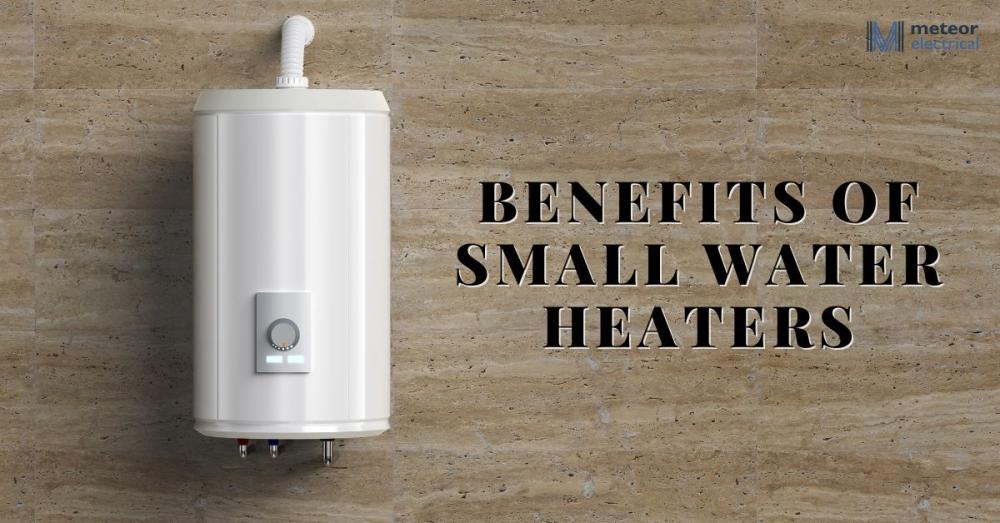
Small water heaters, particularly electric models, offer a multitude of benefits that make them an excellent choice for both domestic and commercial properties. Let’s dive into the key advantages that make these compact appliances a smart investment.
1. Fast and Efficient Hot Water
One of the standout benefits of small electric water heaters is their ability to deliver hot water quickly and efficiently. Unlike traditional heaters that require time to heat a large tank of water, small water heaters use advanced heating elements to warm water almost instantly. This means you can enjoy hot water almost immediately after turning on the faucet, perfect for those moments when you’re in a hurry.
Why It Matters:
- Time-Saving: No more waiting around for the water to heat up.
- Convenience: Ideal for busy households where every second counts.
- Consistent Performance: Maintains a steady temperature even with frequent on/off cycles.
2. Save Large Quantities of Water
Small water heaters are designed to minimise water waste. Traditional tank-style heaters often require you to run the faucet until hot water reaches it, resulting in significant water loss. With a small, wall-mounted heater located near your fixtures, the distance the hot water needs to travel is drastically reduced, cutting down on wasted water.
Environmental and Financial Impact:
- Water Conservation: Helps in reducing your household’s overall water usage.
- Lower Bills: Less water waste translates to lower water and energy bills.
- Eco-Friendly: Contributes to environmental sustainability by conserving precious water resources.
3. Save on Energy and Utility Bills
Energy efficiency is a major advantage of small water heaters. These units heat water on demand rather than maintaining a large reservoir of hot water, which can lead to significant energy savings. By only using energy when you need hot water, small heaters help reduce your overall energy consumption.
Long-Term Savings:
• Reduced Energy Usage: No standby heat loss means more efficient energy use.
• Lower Utility Bills: Savings accumulate over time, making it a cost-effective choice.
• Sustainable Living: Lower energy consumption reduces your household’s carbon footprint.
4. Precise Temperature Control
Modern small water heaters come equipped with precise thermostats that allow you to set and maintain your desired water temperature accurately. This feature ensures that you always have water at the perfect temperature without the need for constant adjustments.
Benefits of Precise Control:
- Comfort: Enjoy water at your preferred temperature consistently.
- Safety: Prevents scalding by maintaining safe temperature levels, especially important for households with children.
- Efficiency: Optimises energy usage by heating water only to the necessary temperature.
5. Convenient Size
The compact size of small water heaters makes them incredibly versatile for installation in various locations. Whether you’re working with limited space in an apartment, renovating your kitchen, or setting up a commercial space, these heaters fit seamlessly without taking up much room.
Flexible Installation Options:
- Under Cabinets: Perfect for kitchens or bathrooms with limited cabinet space.
- Wall-Mounted: Ideal for mounting near sinks or showers to save floor space.
- Discrete Placement: Can be hidden behind cabinetry or within utility closets to maintain the aesthetic appeal of your space.
6. No Need to Worry About Toxic Gasses
Most small water heaters are electric, which means they don’t produce toxic gases like carbon monoxide—a common concern with gas-powered models. This makes electric small water heaters a safer option for many households, eliminating the risks associated with gas leaks and combustion.
Safety Advantages:
- No Gas Emissions: Completely eliminates the risk of harmful gas leaks.
- Lower Maintenance: Electric models generally require less maintenance compared to gas systems.
- Peace of Mind: Enjoy hot water without worrying about the dangers of toxic fumes.
How to Wall Mount Your Small Water Heater?
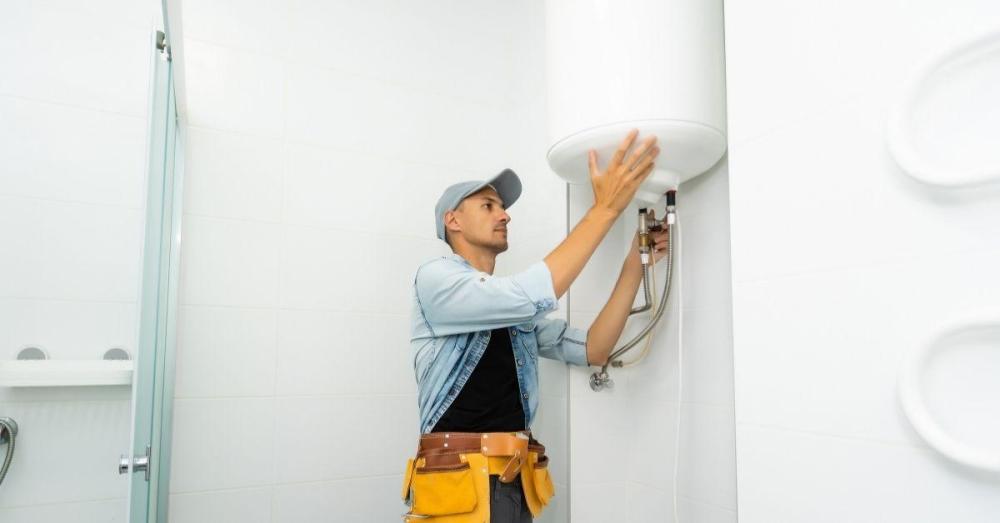
Gone are the days when water heaters dominated your basement with their hefty size. Thanks to innovative technology, small tankless water heaters have emerged as sleek, compact alternatives that seamlessly blend into any living space. Installing one of these modern appliances can be a game-changer, offering both efficiency and aesthetic appeal. Let’s walk through the process of wall mounting your small water heater to achieve a tidy, efficient, and stylish setup.
Why Wall Mount?
Wall mounting your small water heater offers several advantages:
- Space Efficiency: Frees up valuable floor space, making it perfect for smaller homes or apartments.
- Accessibility: Places the heater within easy reach of your sinks or fixtures, reducing the wait time for hot water.
- Aesthetic Appeal: Provides a clean, wire-free look that integrates smoothly with your home’s décor.
Step-by-Step Guide to Wall Mounting
1. Choose the Right Location:
- Proximity to Fixtures: Install the heater near the kitchen sink, bathroom, or any other area with high hot water demand.
- Ventilation: Ensure adequate ventilation, especially for gas-powered models, to prevent overheating and ensure safety.
- Accessibility to Power: Position the heater close to a power source. Electric models can often be plugged into a standard outlet, while some may require hardwiring.
2. Gather Necessary Tools and Materials:
- Wall Brackets: Most wall-mounted water heaters come with sturdy brackets designed to support their weight.
- Screws and Anchors: Ensure you have the appropriate hardware for mounting, especially if drilling into drywall or masonry.
- Level and Measuring Tape: To ensure the heater is mounted straight and at the desired height.
- Template (if provided): Some manufacturers include a mounting template to guide placement.
3. Mark the Mounting Points:
- Use the provided template or measure carefully to mark where the wall brackets will be attached.
- Double-check for levelness to ensure the heater is perfectly straight.
4. Install the Wall Brackets:
- Drill pilot holes where you’ve marked the mounting points.
- Secure the brackets firmly to the wall using screws and anchors. Make sure they can support the weight of the water heater.
5. Mount the Water Heater:
- Carefully lift the heater and secure it onto the wall brackets.
- Ensure it sits flush against the wall and is stable.
6. Connect the Water Supply:
- Incoming Cold Water: Disconnect the existing cold water supply from your faucet and connect it to the water heater’s inlet.
- Outgoing Hot Water: Connect the water heater’s outlet to your faucet or fixture.
7. Power Up:
- Electric Models: Plug the heater into the electrical outlet or hardwire it if required. If you’re adding a new circuit, it’s best to consult a licensed electrician.
- Gas Models: Ensure proper gas line connections and check for leaks using a gas leak detector or soapy water solution.
8. Test the Installation:
- Turn on the water supply and power to the heater.
- Check for any leaks and ensure the heater is functioning correctly.
- Adjust the thermostat to your preferred temperature setting.
DIY vs. Professional Installation
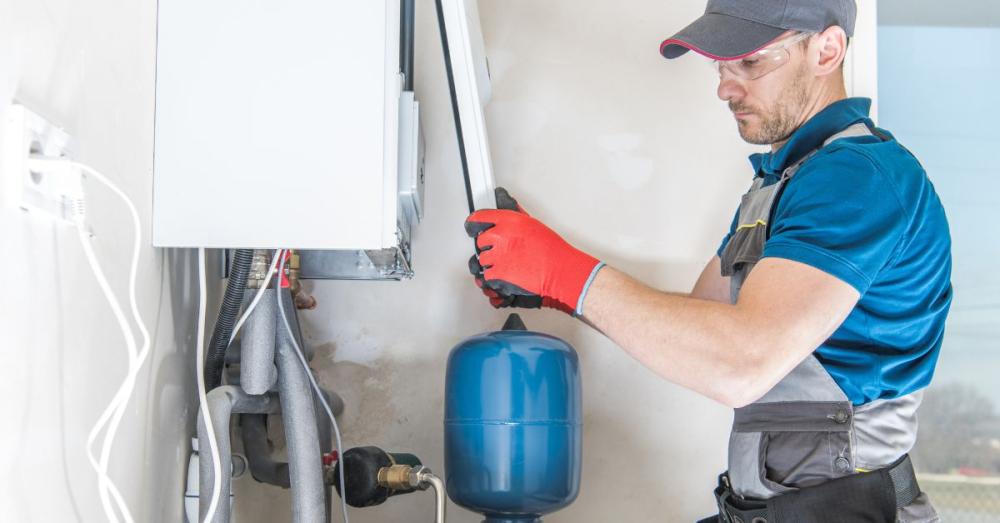
While many small tankless water heaters are designed for DIY installation, there are scenarios where hiring a professional is advisable:
- Electrical Work: If your installation requires new wiring or adding a dedicated circuit, a licensed electrician should handle it to ensure safety and compliance with local codes.
- Gas Connections: Proper installation of gas lines is crucial to prevent leaks and ensure safe operation.
- Complex Plumbing: If your home’s plumbing system is intricate, a professional plumber can ensure seamless integration with your existing setup.
Tips for a Successful Installation
- Follow Manufacturer Instructions: Always refer to the specific guidelines provided by the manufacturer for your model.
- Ensure Proper Ventilation: Especially important for gas heaters to prevent the buildup of harmful gases.
- Use Quality Materials: Invest in high-quality brackets and connectors to ensure the longevity and safety of your installation.
- Regular Maintenance: Periodically check the mounting brackets and connections to ensure everything remains secure and leak-free.
By wall mounting your small water heater, you not only optimise your space but also enhance the efficiency and accessibility of your hot water supply. Whether you tackle the installation yourself or seek professional assistance, the result is a streamlined, efficient, and aesthetically pleasing addition to your home.
Credit: HVAC Guide for Homeowners
How to Choose the Best Small Water Heater
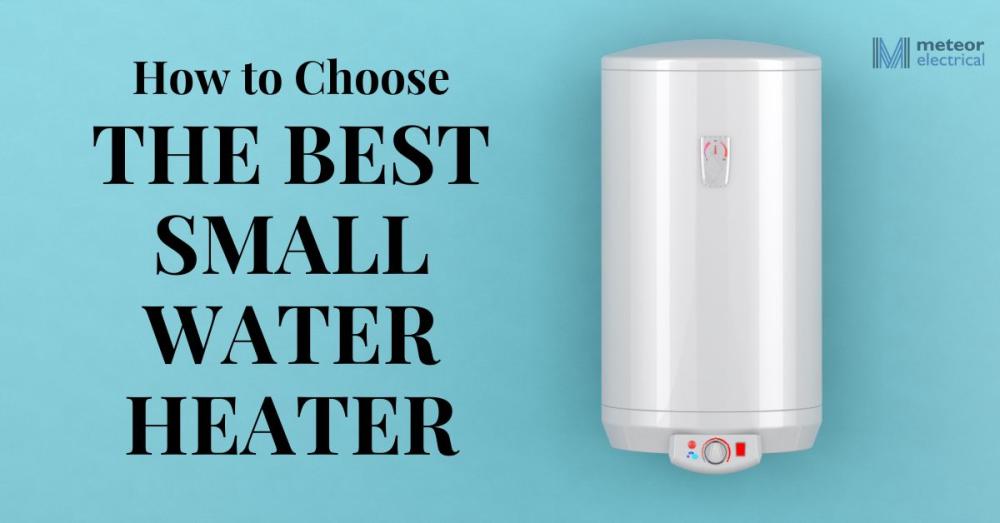
Selecting the perfect small water heater for your home or business might seem daunting, but breaking down the decision into key factors can simplify the process. Here’s a friendly guide to help you navigate through the essential considerations and make an informed choice.
1. Consider the Size
The first step in choosing a small water heater is understanding the space where you plan to install it. Measure the available area meticulously—whether it’s under a sink, inside a cabinet, or mounted on a wall. Knowing the exact dimensions will help you narrow down your options and ensure a snug fit. Remember, a heater that’s too large can waste space, while one that’s too small might not meet your hot water needs.
Pro Tip: Always leave a little extra space for ventilation and future maintenance. This ensures your heater operates efficiently and remains accessible for any necessary upkeep.
2. Assess the Capacity
Capacity is another critical factor to consider. Think about how much hot water you and your household typically use. Are you installing the heater for a single sink, multiple fixtures, or a commercial space with higher demand? Small water heaters come in various capacities, typically measured in liters or gallons.
- For Single Sinks: A 5-liter model might be sufficient, providing ample hot water without unnecessary bulk.
- For Multiple Fixtures: Opt for a 10-liter or 14-liter heater to ensure a steady supply across different areas.
By accurately gauging your hot water needs, you can select a heater that delivers consistent performance without overextending your budget.
3. Look for Safety Features
Safety should never be compromised when selecting a water heater. Modern small water heaters come equipped with advanced safety features that enhance their reliability and user-friendliness.
- Efficient Thermostats: These allow precise temperature control, ensuring the water is heated to your desired level without overheating.
- Modulation Technology: This feature adjusts the heat output based on the water flow, maintaining a stable temperature even when usage fluctuates.
- Automatic Shut-Off: In case of any malfunction or overheating, this feature automatically turns off the heater to prevent accidents.
Ensuring your small water heater has these safety features not only protects your home but also extends the appliance’s lifespan.
4. Energy Efficiency
In today’s eco-conscious world, energy efficiency is a top priority. Small water heaters are inherently more energy-efficient than traditional tank-style models because they heat water on demand, reducing standby energy losses. Look for units with high energy efficiency ratings or certifications like Energy Star. These models consume less power, leading to lower utility bills and a smaller carbon footprint.
5. Installation and Maintenance
Ease of installation and maintenance can significantly impact your overall experience with a small water heater. Many models are designed for DIY installation, complete with clear instructions and all necessary mounting hardware. However, if your setup requires additional electrical work or plumbing modifications, consulting a professional might be the best route.
Regular maintenance is essential to keep your heater running smoothly. Look for models that are easy to access and clean, with replaceable parts that can be easily swapped out when needed.
6. Brand Reputation and Warranty
Choosing a reputable brand can provide peace of mind and ensure you’re investing in a quality product. Brands like ATC, available through Meteor Electrical, are known for their reliability and customer support. Additionally, a solid warranty can protect your investment against defects and unforeseen issues, offering added security and value.
Maintenance Tips for Small Water Heaters
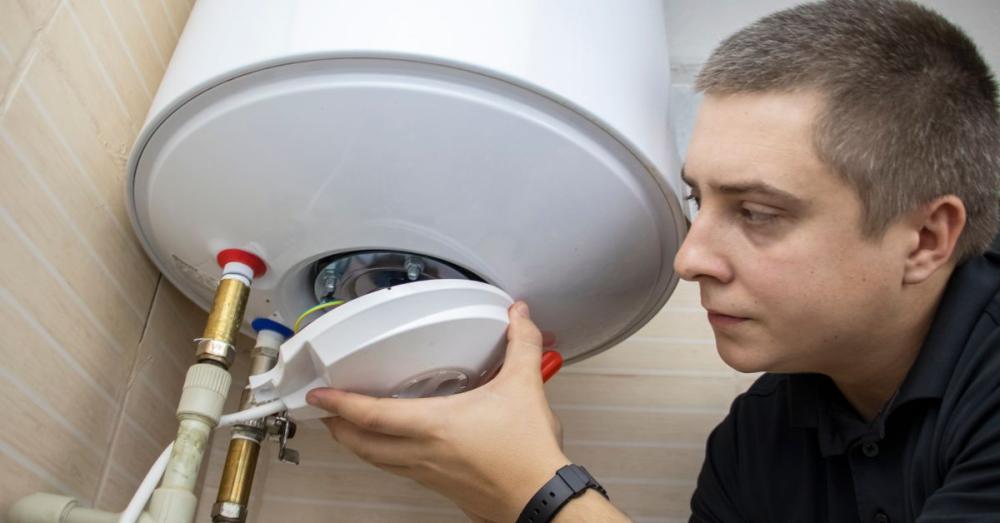
To ensure your small water heater operates efficiently and has a long lifespan, regular maintenance is essential. Here are some maintenance tips to keep your system in top condition:
1. Regular Cleaning:
- Exterior: Wipe down the exterior of the heater to remove dust, dirt, and debris.
- Interior: Periodically check and clean the internal components, such as the heating elements or burners, to prevent buildup that can impair performance.
2. Check for Leaks:
- Inspect all connections and joints for signs of water leakage.
- Address any leaks immediately to prevent water damage and maintain system efficiency.
3. Flush the System:
- Over time, minerals and sediment can accumulate inside the heater, reducing efficiency.
- Flushing the system annually helps remove these deposits and ensures optimal heating performance.
4. Inspect the Thermostat:
- Ensure the thermostat is functioning correctly and maintaining the desired temperature settings.
- Replace or recalibrate the thermostat if you notice inconsistencies in water temperature.
5. Test the Pressure Relief Valve:
- The pressure relief valve is a critical safety feature that prevents excessive pressure buildup.
- Test the valve periodically by lifting the test lever to ensure it releases water appropriately.
6. Monitor Energy Usage:
- Keep an eye on your energy bills to detect any unusual spikes that might indicate inefficiency or a malfunctioning heater.
- Address any irregularities promptly to maintain energy efficiency.
7. Professional Inspections:
- Schedule regular inspections with a licensed professional to identify and address potential issues before they escalate.
- Professionals can perform more in-depth maintenance tasks and ensure that all components are functioning correctly.
8. Replace Worn Parts:
- Components such as seals, gaskets, and heating elements can wear out over time.
- Replace these parts as needed to maintain the heater's performance and prevent breakdowns.
By adhering to these maintenance practices, you can extend the lifespan of your small water heater, ensure consistent hot water availability, and optimise energy efficiency.
Comparing Small Water Heaters to Traditional Tank Models
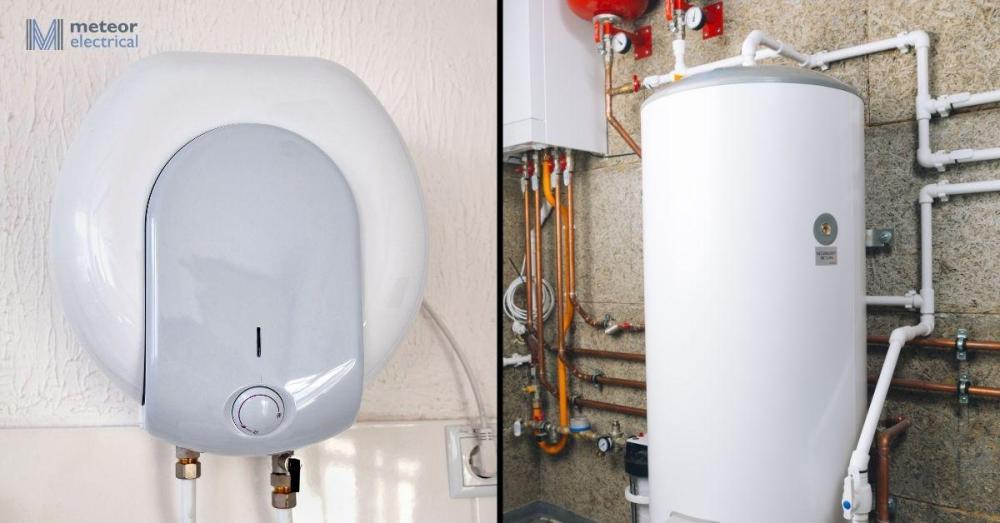
Understanding the differences between small water heaters and traditional tank-style models can help you make an informed decision based on your specific needs and circumstances. Here's a comparative overview:
| Feature | Small Water Heaters | Traditional Tank Water Heaters |
|---|---|---|
| Size | Compact, suitable for small spaces | Large, requires significant space |
| Energy Efficiency | Higher efficiency, on-demand heating | Lower efficiency due to standby heat loss |
| Installation | Flexible, can be installed under sinks or walls | Typically installed in basements or utility rooms |
| Initial Cost | Generally lower, especially for tankless models | Higher upfront cost |
| Maintenance | Requires regular maintenance for optimal performance | Regular tank maintenance to prevent sediment buildup |
| Hot Water Supply | Unlimited supply when on-demand | Limited by tank capacity, can run out during high demand |
| Lifespan | Longer lifespan, especially tankless models | Shorter lifespan, typically 10-15 years |
| Environmental Impact | More eco-friendly due to lower energy consumption | Less eco-friendly due to higher energy use |
| Versatility | Can be installed in multiple locations | Fixed installation location |
Key Takeaways:
- Efficiency: Small water heaters, especially tankless models, are more energy-efficient, reducing your carbon footprint and lowering utility bills.
- Space: Their compact design makes them ideal for homes with limited space, offering flexibility in placement that traditional tanks cannot match.
- Cost: While tankless small heaters may have a higher initial cost, the long-term savings on energy and maintenance can make them a more economical choice.
- Hot Water Supply: If your household has high hot water demands, a traditional tank might struggle to keep up, whereas a tankless small heater can provide a continuous supply as needed.
- Installation and Maintenance: Small water heaters are generally easier and quicker to install, with less maintenance required compared to traditional models.
Ultimately, the choice between a small water heater and a traditional tank model depends on your specific needs, space availability, and budget. However, the growing trend towards energy efficiency and space optimisation makes small water heaters an increasingly popular choice for modern households and businesses.
Integrating Small Water Heaters into Your Home's Plumbing System
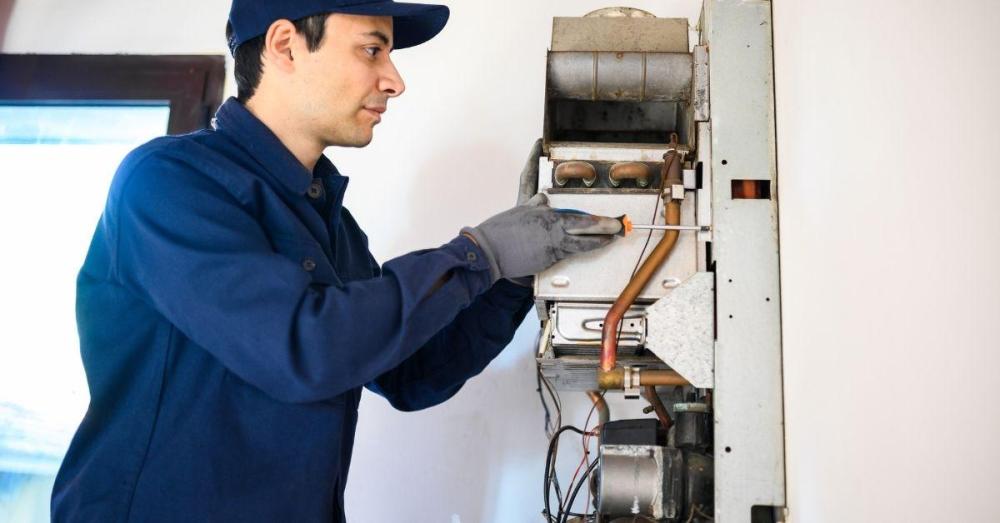
Incorporating small water heaters into your home's existing plumbing system can enhance efficiency and ensure a steady supply of hot water where you need it most. Here's how you can effectively integrate these compact units:
1. Identify High-Demand Areas:
- Kitchens, bathrooms, laundry rooms, and outdoor faucets are common areas with high hot water demands.
- Installing small water heaters near these fixtures can reduce wait times and water wastage.
2. Point-of-Use Installation:
- Under-Sink Installations: Ideal for kitchens and bathrooms, providing instant hot water for sinks and dishwashers.
- Near Appliances: Install small heaters near washing machines or dishwashers to ensure a consistent supply of hot water.
3. Parallel Installation with Existing Systems:
- Pair small water heaters with your main hot water system to handle peak demands without overburdening the primary heater.
- This setup can balance the load, enhancing overall system efficiency and reliability.
4. Zoned Hot Water Distribution:
- Create zones in your home where small water heaters serve specific areas.
- This approach allows for targeted heating, ensuring each zone has the hot water supply it requires without unnecessary energy consumption.
5. Integration with Renewable Energy Sources:
- Pairing small water heaters with solar panels or other renewable energy systems can further enhance energy efficiency and sustainability.
- This integration reduces reliance on traditional energy sources, lowering your carbon footprint.
6. Smart Controls and Automation:
- Utilise smart thermostats and control systems to manage your small water heaters effectively.
- Automation can optimise heating schedules, ensuring hot water is available when needed while minimising energy usage during off-peak times.
7. Consistent Maintenance Across Systems:
- Regularly maintain both your main and small water heaters to ensure seamless operation.
- Consistent maintenance helps prevent conflicts and ensures all components work harmoniously.
By thoughtfully integrating small water heaters into your plumbing system, you can maximise their benefits, ensuring efficient hot water delivery throughout your home while minimising energy consumption and costs.
Credit: FOX59 News
What Are the Best Small Water Heaters on the Market?
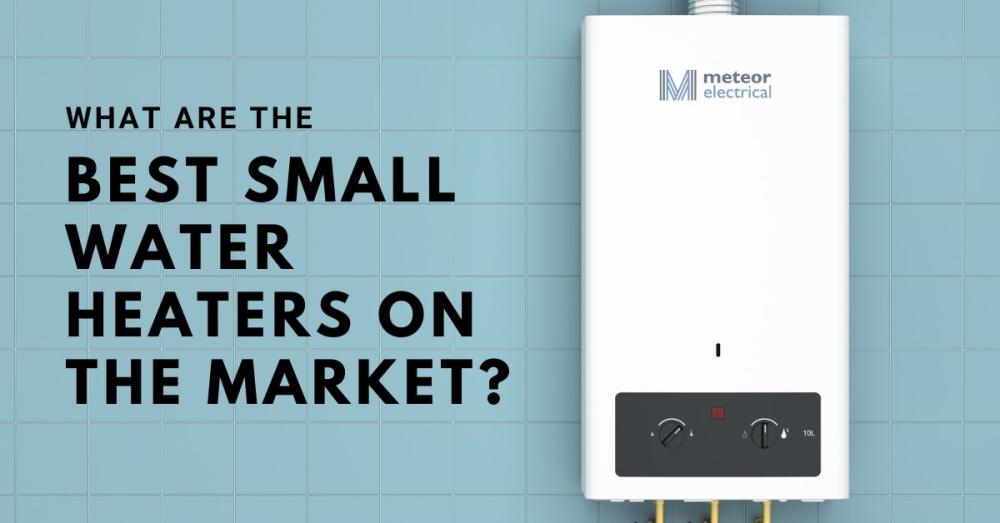
When it comes to finding the best small water heaters, quality and efficiency are paramount. Meteor Electrical proudly offers a range of top-tier small water heaters from ATC, a leading manufacturer renowned for their energy-efficient and durable products. Let’s explore some of the standout options available:
1. ATC 5-Litre Under Sink Water Heater
Perfect for compact spaces, the ATC 5-litre Under Sink Water Heater is an excellent choice for households with moderate hot water needs. Its sleek design allows it to fit snugly under any sink, providing instant hot water without taking up much space.
Key Features:
- Compact Size: Easily fits under sinks or in tight cabinets.
- Energy Efficiency: Heats water quickly, reducing energy consumption and costs.
- Durable Construction: Made from high-quality materials for long-lasting performance.
- Easy Installation: Can be wall-mounted or placed on a solid base with minimal effort.
This model is ideal for kitchens or bathrooms where space is at a premium but hot water availability is essential.
2. ATC 10-Litre Under Sink Water Heater
For those needing a bit more hot water without compromising on space, the ATC 10-litre Under Sink Water Heater is a fantastic option. It strikes a perfect balance between capacity and size, making it versatile enough for both residential and light commercial use.
Key Features:
- Increased Capacity: Provides more hot water for multiple fixtures or larger families.
- Flexible Installation: Suitable for various locations, offering greater flexibility in placement.
- High Efficiency: Maintains optimal temperature with minimal energy usage.
- Reliable Performance: Consistently delivers hot water, even during high demand.
Whether you’re running multiple sinks or need hot water for appliances like dishwashers and washing machines, this model ensures you have the supply you need without interruption.
3. ATC 14-Litre Under Sink Water Heater
If your hot water demands are higher, the ATC 14-litre Under Sink Water Heater is designed to meet those needs efficiently. Its larger capacity ensures a steady supply of hot water, making it suitable for larger households or commercial settings where multiple hot water points are in use simultaneously.
Key Features:
- Ample Capacity: Delivers a consistent flow of hot water for multiple fixtures.
- Compact Design: Despite its larger capacity, it remains compact and easy to install.
- Advanced Safety Features: Includes precise thermostats and modulation for safe and efficient operation.
- Long-Lasting Durability: Built to withstand regular use without compromising performance.
This model is perfect for busy kitchens, commercial offices, or any environment where reliable hot water is crucial.
Final Takeaway
Choosing the right water heater can transform your hot water experience, offering efficiency, convenience, and significant cost savings. Meteor Electrical is your go-to destination for top-quality small water heaters from trusted brands like ATC. Here’s why Meteor Electrical stands out:
- Diverse Selection: Whether you need a compact 5-litre model for a single sink or a robust 14-litre unit for multiple fixtures, Meteor Electrical has you covered.
- Energy Efficiency: All ATC water heaters are designed to maximise energy savings, helping you reduce your utility bills while minimising your environmental impact.
- Ease of Installation: With user-friendly designs and comprehensive installation guides, many of our water heaters are perfect for DIY enthusiasts. For more complex setups, our professional support ensures a smooth installation process.
- Reliability and Durability: Built with high-quality materials and backed by solid warranties, our water heaters are designed to last, providing you with years of dependable service.
- Exceptional Customer Support: At Meteor Electrical, customer satisfaction is our priority. Our knowledgeable team is always ready to help you choose the best product and assist with any questions you may have.
Investing in a small water heater from Meteor Electrical means choosing a solution that’s tailored to your specific needs, ensuring you enjoy consistent, reliable hot water without the hassle of bulky traditional systems.
Ready to Upgrade? Explore our range of ATC small water heaters today and discover the perfect fit for your home or business. With Meteor Electrical, you’re not just buying a water heater—you’re investing in comfort, efficiency, and peace of mind. Contact Meteor Electrical now to find out more and take the first step towards a smarter, more efficient hot water solution!
Frequently Asked Questions (FAQs)
1. Can I install a small water heater myself, or should I hire a professional?
While many small water heaters are designed for DIY installation with clear instructions and included mounting hardware, some installations—especially those requiring new electrical circuits or gas connections—may be best handled by professionals. If you're comfortable with basic plumbing and electrical work, you can likely install the heater yourself. However, for complex setups or to ensure compliance with local codes, hiring a licensed plumber or electrician is recommended.
2. How long do small water heaters typically last?
The lifespan of a small water heater varies based on the model and maintenance, but generally:
- Tankless Small Water Heaters: Can last up to 20 years or more with proper care.
- Small Tank Water Heaters: Typically last around 10-15 years. Regular maintenance, such as flushing the system and checking for leaks, can help extend the lifespan of your water heater.
3. Are small water heaters more energy-efficient than traditional tank-style models?
Yes, small water heaters are generally more energy-efficient than traditional tank-style heaters. Since they heat water on demand rather than maintaining a large reservoir of hot water, they reduce standby energy losses. Tankless models, in particular, only use energy when hot water is needed, leading to significant energy savings and lower utility bills.
4. What maintenance is required for small water heaters?
To ensure optimal performance and longevity of your small water heater, regular maintenance is essential:
- Regular Cleaning: Keep the exterior clean and periodically inspect the interior components for buildup.
- Check for Leaks: Inspect all connections and joints for signs of water leakage.
- Flush the System: Annually flush the heater to remove mineral deposits and sediment.
- Inspect the Thermostat: Ensure the thermostat is functioning correctly and maintaining the desired temperature.
- Test Safety Features: Regularly test the pressure relief valve and other safety mechanisms. Following the manufacturer's maintenance guidelines will help keep your water heater running smoothly.
5. Can small water heaters support multiple fixtures simultaneously?
Yes, certain small water heaters, especially higher-capacity models like the ATC 10-liter or 14-liter under-sink water heaters, are designed to support multiple fixtures simultaneously. By strategically placing multiple units in different locations, you can ensure a consistent supply of hot water across various points of use, such as multiple sinks, showers, or appliances. However, it's important to assess your household's hot water demand to choose the appropriate capacity and number of units needed.

